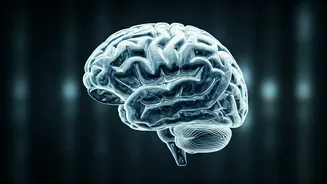Poor Sleep Patterns
One of the most significant disruptors of brain health is inadequate sleep. When you deprive yourself of sufficient rest, the brain struggles to consolidate
memories and eliminate toxins. Aim for 7-9 hours of quality sleep per night to allow the brain to reset and repair itself. Chronic sleep deprivation can lead to cognitive decline, memory issues, and increase the risk of neurological diseases. Consistent sleep schedules and a relaxing bedtime routine are essential. Make your bedroom a sleep-friendly sanctuary, ensuring it's dark, quiet, and cool. Avoid screens and stimulants like caffeine close to bedtime. Prioritizing sleep is a non-negotiable step toward a healthier brain and a sharper memory.
Unhealthy Diet Choices
The food you consume directly impacts your brain function. A diet high in processed foods, sugar, and unhealthy fats can lead to inflammation and oxidative stress, damaging brain cells. Conversely, a diet rich in fruits, vegetables, whole grains, and healthy fats is vital for brain health. Include foods like blueberries, spinach, avocados, and fatty fish in your meals, as they're packed with brain-boosting nutrients. Limiting processed foods, sugary drinks, and excessive alcohol is crucial. Opt for a balanced diet that supports overall well-being and promotes optimal cognitive function. Consider incorporating foods that support the gut-brain connection, as a healthy gut is linked to a healthy mind.
Lack of Physical Activity
Physical inactivity contributes to brain aging and memory decline. Exercise boosts blood flow to the brain, delivers oxygen and nutrients, and encourages the growth of new brain cells. Engage in regular physical activity, aiming for at least 150 minutes of moderate-intensity exercise or 75 minutes of vigorous exercise per week. Activities like brisk walking, jogging, swimming, or dancing are beneficial. Exercise also reduces stress and improves mood, indirectly supporting brain health. Incorporate movement into your daily routine—take the stairs, walk during lunch breaks, or stand up while working. The more active you are, the better your brain functions will become.
Chronic Stress Levels
Sustained stress releases cortisol, a stress hormone that can damage brain cells and impair memory. Finding healthy ways to manage stress is crucial. Practice stress-reducing activities like meditation, deep breathing exercises, or yoga. Engage in hobbies and activities that bring you joy. Spend time in nature, which has been shown to reduce stress levels. Build a strong support network of friends and family. If stress becomes overwhelming, consider seeking professional help through therapy or counseling. By managing stress, you protect your brain from its harmful effects and preserve cognitive function.
Social Isolation Dangers
Social interaction is essential for brain health. Feeling isolated or lonely can accelerate cognitive decline. Stay connected with others, maintain social relationships, and engage in social activities. Participate in group activities, clubs, or volunteer work. Regular social interactions stimulate the brain and help maintain cognitive skills. Make an effort to connect with friends and family regularly. Strong social connections protect against cognitive decline and contribute to a healthier, more resilient brain. Prioritize social engagement as a key component of a brain-healthy lifestyle.
Insufficient Mental Stimulation
Challenging your brain regularly is essential to maintaining cognitive function. Engage in mentally stimulating activities like reading, learning new skills, solving puzzles, or playing strategic games. Regularly challenge yourself with new knowledge and experiences. This helps build new neural pathways and strengthens existing ones. Keep your brain active by trying new things, whether it's learning a new language, taking up a musical instrument, or exploring different cultures. Mental exercises are just as important as physical exercise for maintaining a sharp, healthy brain.
Overconsumption of Alcohol
Excessive alcohol consumption can severely damage the brain and impair memory. Alcohol can lead to brain shrinkage and increase the risk of dementia. Limit alcohol intake or avoid it altogether. If you choose to drink, do so in moderation—up to one drink per day for women and up to two drinks per day for men. Excessive drinking also disrupts sleep, which further harms brain function. Be mindful of your alcohol consumption and prioritize brain health. Educate yourself on the negative effects of alcohol on the brain and take steps to avoid overconsumption. Making a conscious effort to limit or avoid alcohol is an important step towards preserving cognitive function and a healthy memory.
















